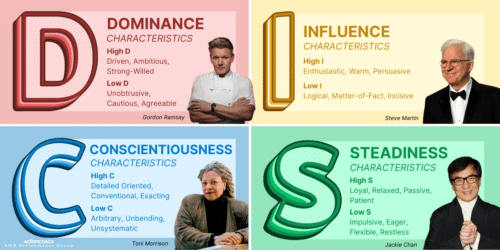The Importance of a Work Personality Test in DISC Leadership Development for Small Business Owners
In the competitive landscape of small business, the ability to understand and manage diverse personality traits within a team is a valuable asset. The work personality test is a key tool that helps leaders identify these traits, facilitating better communication, collaboration, and productivity. Among the various personality assessment tools available, the DISC leadership framework stands out as a highly effective method for developing leadership skills and improving team dynamics. This blog will explore how work personality tests and DISC leadership principles can work together to drive organizational success, especially for small business owners.
What is the DISC Personality Test for Leadership?
The DISC personality test for leadership is a psychological assessment that categorizes human behavior into four primary types: Dominance, Influence, Steadiness, and Conscientiousness. Each personality type has distinct characteristics that influence how individuals approach tasks, interact with others, and respond to challenges. Understanding these personality types through the DISC framework enables leaders to tailor their management styles to better meet the needs of their team members.
Why are Personality Tests Important in the Workplace?
Personality tests like the DISC are important in the workplace because they provide insights into how individuals are likely to behave in various work situations. These insights help small business owners:
- Improve Team Dynamics: By understanding personality traits, leaders can create cohesive and collaborative teams.
- Enhance Communication: Insights into communication preferences can lead to clearer expectations and faster resolution of issues.
- Target Development Strategies: Tailor development plans to the specific needs of each team member.
- Increase Self-Awareness: Leaders gain a deeper understanding of their own strengths and areas for improvement.
The DISC Leadership Framework
The DISC leadership framework is based on the DISC personality model, which categorizes human behavior into four primary types: Dominance, Influence, Steadiness, and Conscientiousness. Each personality type has distinct characteristics that influence how individuals approach tasks, interact with others, and respond to challenges. Understanding these personality types through the DISC framework enables leaders to tailor their management styles to better meet the needs of their team members.
1. Dominance (D)
Characteristics:
- Assertive, goal-oriented, driven by results.
- Prefer to take charge and lead projects.
- Direct and straightforward in communication.
- Enjoy solving problems and taking on new challenges.
Strengths:
- Natural leaders who thrive in competitive environments.
- Highly motivated by challenges and achievements.
- Decisive and able to make quick, effective decisions.
- Strong ability to influence and inspire others to take action.
Application:
- Leadership Roles: Assign them to roles where they can lead projects and make key decisions. Their assertiveness can help drive projects forward.
- Setting Goals: Utilize their goal-oriented nature to set ambitious targets and create strategic plans.
- Problem-Solving: Involve them in troubleshooting and problem-solving tasks where their direct approach can quickly identify and address issues.
- Motivation: Provide opportunities for them to tackle challenging tasks and recognize their achievements to keep them motivated.
Example:
- In a small business setting, a Dominance personality might excel as a sales manager, where they can set aggressive sales targets and lead their team to achieve them through decisive action and strategic planning.
2. Influence (I)
Characteristics:
- Outgoing, enthusiastic, persuasive.
- Enjoy social interactions and building relationships.
- Positive and energetic, often seen as the team cheerleader.
- Strong communication skills and a knack for motivating others.
Strengths:
- Excel in social situations and collaborative environments.
- Skilled at building relationships and fostering team spirit.
- Effective at motivating and inspiring team members.
- Creative and often bring innovative ideas to the table.
Application:
- Team Building: Use their enthusiasm and social skills to foster a positive and collaborative team environment.
- Client Relations: Assign them to roles that involve customer interaction, such as sales or client support, where their persuasive nature can build strong client relationships.
- Communication: Leverage their communication skills in roles that require presenting, negotiating, or marketing.
- Innovation: Encourage them to contribute ideas during brainstorming sessions and recognize their creativity.
Example:
- In a small business, an Influence personality might be ideal for a marketing role, where their creativity and persuasive skills can be used to create engaging marketing campaigns and build strong customer relationships.
3. Steadiness (S)
Characteristics:
- Dependable, patient, supportive.
- Value stability, consistency, and teamwork.
- Calm and composed, even in stressful situations.
- Prefer a harmonious and cooperative work environment.
Strengths:
- Reliable and consistent in their work.
- Excellent collaborators who support team efforts.
- Patient and good at managing long-term projects.
- Strong conflict resolution skills, often acting as mediators.
Application:
- Operations: Place them in roles that require consistency and reliability, such as operations or project management, where their steadiness ensures smooth processes.
- Team Support: Use their supportive nature to mentor and coach other team members.
- Long-Term Projects: Assign them to long-term projects where their patience and persistence will ensure successful completion.
- Conflict Resolution: Involve them in mediating conflicts within the team, leveraging their calm and composed demeanor.
Example:
- A Steadiness personality might be well-suited for a role in human resources, where their supportive and patient nature can help manage employee relations and foster a positive workplace culture.
4. Conscientiousness (C)
Characteristics:
- Detail-oriented, analytical, methodical.
- Strive for accuracy, quality, and precision.
- Prefer structured and organized work environments.
- Highly focused on data and factual information.
Strengths:
- Excel in roles requiring careful planning and attention to detail.
- Methodical approach ensures high standards and quality output.
- Strong analytical skills and ability to process complex information.
- Reliable and consistent in following procedures and protocols.
Application:
- Quality Control: Assign them to roles in quality assurance or data analysis, where their attention to detail ensures high standards.
- Project Planning: Use their analytical skills in project planning and management, where their methodical approach can help outline detailed plans and schedules.
- Research: Involve them in research tasks that require thorough investigation and data analysis.
- Process Improvement: Leverage their ability to identify areas for improvement in processes and procedures to enhance operational efficiency.
Example:
- In a small business, a Conscientiousness personality might excel as an accountant or financial analyst, where their precision and analytical skills ensure accurate financial records and insightful financial planning.

What is the DISC Personality Test for Managers?
The DISC personality test for managers is a powerful tool designed to help identify and understand different managerial styles. By categorizing behaviors and traits into four primary types (Dominance, Influence, Steadiness, and Conscientiousness), the DISC test provides insights that are crucial for effective team leadership and management. For small business owners, this test offers several valuable benefits:
Identifying Leadership Strengths
Objective: Understand natural leadership qualities and areas for development.
How It Works:
- Assessment of Traits: The DISC test evaluates traits such as assertiveness, enthusiasm, reliability, and attention to detail, helping to highlight a manager’s natural strengths.
- Development Areas: It also identifies areas where managers may need to develop further skills or adapt their styles to be more effective leaders.
- Actionable Insights: Small business owners can use these insights to tailor leadership development programs, ensuring that managers receive the training and support needed to enhance their strengths and address any weaknesses.
Examples:
- Dominance: Managers with high Dominance traits are naturally assertive and goal-oriented, making them effective at driving results and making quick decisions.
- Influence: Those with high Influence are great at motivating their teams and fostering a positive work environment through their enthusiasm and social skills.
- Steadiness: Managers with high Steadiness traits are reliable and supportive, ensuring stability and consistency in their teams.
- Conscientiousness: High Conscientiousness managers are detail-oriented and methodical, excelling in planning and quality control.
Tailoring Communication Styles
Objective: Adapt communication to suit different team members’ preferences.
How It Works:
- Personalized Communication: The DISC test reveals how different personality types prefer to communicate and receive feedback.
- Effective Interaction: Managers can tailor their communication styles to align with the preferences of their team members, ensuring clearer and more effective interactions.
- Improved Team Dynamics: By understanding and adapting to these communication styles, managers can foster a more harmonious and productive team environment.
Examples:
- Dominance: Direct and concise communication is key. They appreciate clear, to-the-point discussions without unnecessary details.
- Influence: Engaging and enthusiastic communication works best. They respond well to positive reinforcement and lively interactions.
- Steadiness: Patient and supportive communication is important. They value stability and prefer a calm, consistent approach.
- Conscientiousness: Detailed and structured communication is preferred. They appreciate thorough explanations and clear, factual information.
Anticipating and Mitigating Conflict
Objective: Understand potential sources of conflict and develop strategies to resolve them.
How It Works:
- Conflict Identification: The DISC test helps identify potential areas of conflict by revealing differing personality traits and preferences within the team.
- Proactive Management: Managers can use this knowledge to anticipate conflicts and address them before they escalate.
- Conflict Resolution Strategies: The test provides insights into how each personality type handles conflict, allowing managers to tailor their resolution strategies accordingly.
Examples:
- Dominance: They may be more prone to confrontations due to their assertive nature. Address conflicts with them directly and focus on finding solutions quickly.
- Influence: They might avoid conflicts to maintain harmony. Encourage open discussions and reassure them that addressing conflicts can lead to positive outcomes.
- Steadiness: They may feel uncomfortable with conflict and prefer to avoid it. Approach conflicts with patience and provide a supportive environment for resolution.
- Conscientiousness: They may focus on details and facts during conflicts. Ensure that conflict resolution is structured and based on logical, fact-based discussions.
How Can You Use Your DISC Results to Develop Your Leadership Skills?
Using DISC results to develop leadership skills involves:
- Self-Assessment: Understanding your DISC profile to identify strengths and areas for improvement.
- Personalized Development: Creating tailored development plans based on your DISC profile.
- Enhanced Communication: Adapting your communication style to better connect with team members.
- Strategic Team Building: Assigning roles and responsibilities that align with team members’ DISC profiles for better synergy and productivity.
Benefits of Work Personality Tests in DISC Leadership Development
Integrating work personality tests into DISC leadership development offers several key benefits for small business owners:
Enhanced Self-Awareness
- Description: Provides leaders with a deeper understanding of their own personality traits, strengths, and areas for improvement.
- Benefit: More effective management and better decision-making.
Improved Team Dynamics
- Description: Understanding personality traits helps create cohesive and collaborative teams.
- Benefit: Maximize efficiency and harmony of smaller teams.
Targeted Development Strategies
- Description: Tailor development strategies to the specific needs of team members.
- Benefit: Develop a high-performing team with a personalized approach.
Enhanced Communication
- Description: Insights into communication preferences and feedback reception.
- Benefit: Faster resolution of issues, clearer expectations, more positive work environment.
Implementing Work Personality Tests in Leadership Development Programs
To maximize the benefits of work personality tests in DISC leadership development, small business owners should follow these best practices:
Select the Right Assessment Tool
- Tip: Choose a reliable and validated assessment tool that aligns with leadership development goals.
Integrate Assessments into Development Programs
- Tip: Use assessment results to inform coaching sessions, training workshops, and performance evaluations.
Provide Feedback and Support
- Tip: Offer detailed feedback and ongoing support to help leaders apply insights in real-world situations.
Foster a Culture of Continuous Improvement
- Tip: Encourage regular assessments to track development and adjust strategies as needed.
Ready to transform your leadership team and optimize your business operations? At AMB Performance Group, we specialize in helping small business owners harness the power of work personality tests and DISC leadership development. We offer personalized assessments and tailored development programs to enhance your team’s communication, collaboration, and overall performance.
Take advantage of our FREE DISC assessments for you and your top three highest-level employees. Gain valuable insights into your team’s strengths and areas for improvement, and start making better management decisions today.
Click here to learn more about how our DISC assessments can benefit your small business. Let AMB Performance Group help you unlock your team’s full potential and drive your business towards greater success today!

